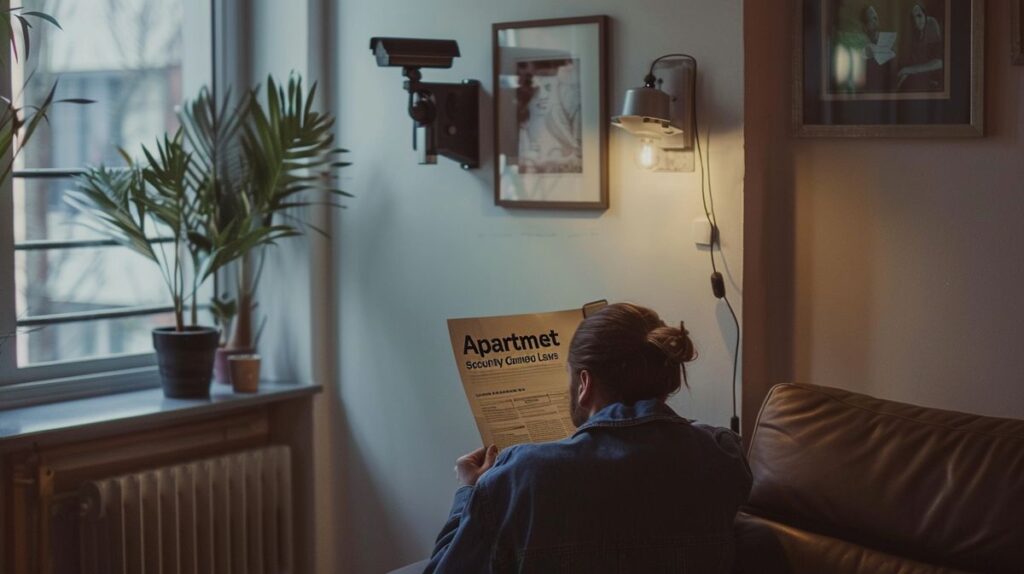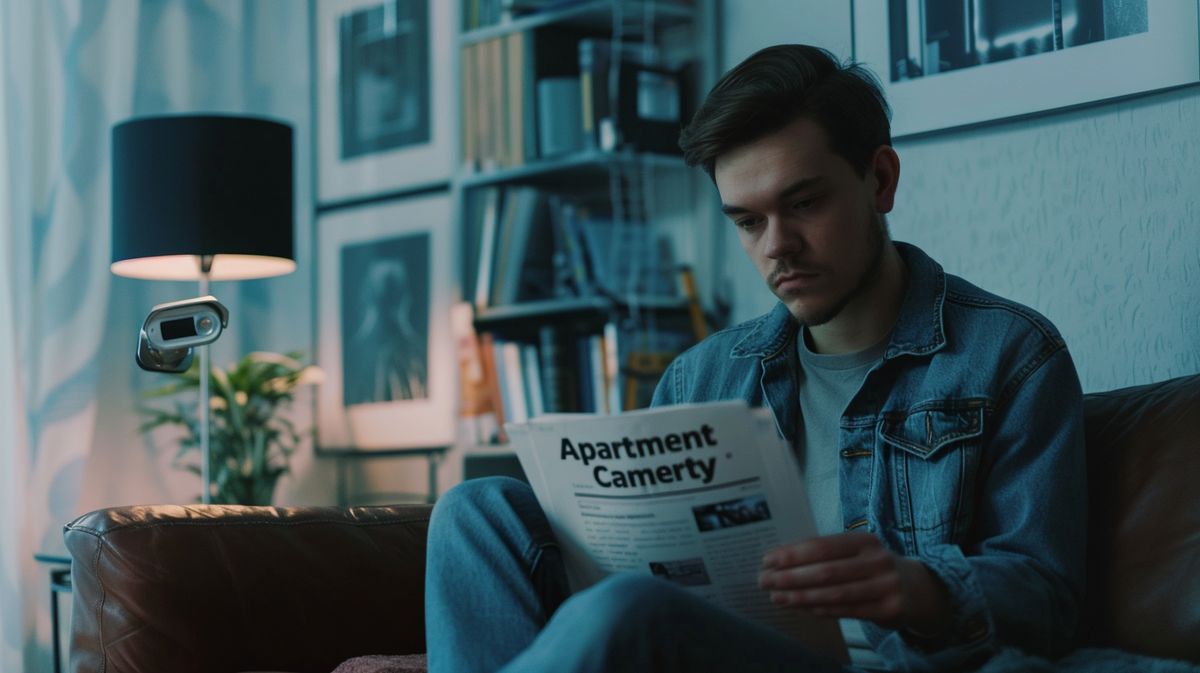Ultimate Guide: Apartment Security Camera Laws for Tenants Explained
Ever felt watched while heading up to your apartment? You’re not alone, and with the advancements in surveillance technology in recent years, understanding apartment security camera laws has become crucial for every tenant. Hello, I’m James Albright, and I’ll guide you through this complex legal labyrinth from a tenant’s perspective so that you can start feeling secure in your own space again.
We’ll investigate where the thin line between enhanced security and invasion of privacy lies. How do these camera laws impact you, and what rights do you have as a tenant in 2024?
So, grab your legal notepad, and let’s dive into this essential guide. Because if there’s one thing I believe in, it’s that knowledge is the first defense line against any intrusion – be it a burglar or an overambitious landlord.
Understanding Federal Privacy Rights Concerning Surveillance Cameras
Learning about apartment security camera laws for tenants is crucial. It’s all about understanding your rights to privacy and the limitations landlords must adhere to. Here, we’ll explore key areas where privacy is paramount and what measures are in place to protect tenant rights.
Expectations of Privacy
- Imagine finding a camera in your bedroom or bathroom. Unthinkable, right? That’s because federal laws safeguard your privacy in these personal spaces. Legislation makes it clear: surveillance in these zones is off-limits.
- These areas are where you expect the most privacy. That’s why laws strictly prohibit any form of surveillance in such intimate settings, ensuring your sanctuary remains undisturbed by prying eyes.
- By familiarizing yourself with the Federal Wiretap Act (18 U.S.C. § 2511) and other relevant laws, you can feel more secure knowing your legal protections against unauthorized surveillance are robust.
Prohibited Areas for Surveillance
- Surveillance in private areas like your bedroom, bathroom, or areas you expect absolute privacy? Absolutely not. Apartment security camera laws for tenants firmly dictate that such surveillance is illegal.
- Here’s a golden rule: all cameras must be clearly visible. Hidden cameras in these private spaces are strictly forbidden to make sure your privacy is inviolate.
In this video, learn about the essential laws regarding security cameras in apartments, including the importance of consent and privacy expectations that every tenant should be aware of.
The law simply doesn’t allow hidden eyes watching you in these intimate zones. - Furthermore, recording audio in these private areas? That’s a whole different ball game. Such practices are heavily regulated. In most cases, explicit consent from those being recorded is a must. This ensures compliance with the highest privacy standards.
State-Specific Security Camera Laws in Apartment Complexes
Understanding the intricacies of state security camera laws is crucial for both landlords and tenants. These regulations can vary widely, and it’s essential to know what’s allowed and what’s not to avoid hefty penalties. Let’s break down some of these laws together.
Variation in State Regulations
- Regulations about surveillance cameras in apartment complexes aren’t uniform. Some states have strict guidelines, while others are more relaxed. Does your state require all-party consent for recordings? Or just one-party consent? It’s vital to know.
- In all-party consent states, everyone in the recording needs to agree. But in one-party consent states, only one person’s permission is needed. This difference is crucial for avoiding legal trouble.
- Both landlords and tenants should be savvy about their state’s specific security camera laws.
In this insightful video, discover the legal nuances of installing security cameras in residential areas. Learn how to balance your right to security with the privacy rights of others, and understand what constitutes an invasion of privacy under apartment security camera laws.
Forgetting to comply can lead to severe consequences like fines and legal battles.
Notable Examples of State Laws
- Take California, for instance. With Penal Code §647 and §632, you can’t record in private areas without everyone’s consent. Landlords here can’t sneakily place cameras in tenants’ private spaces without breaking the law.
- Then there’s Prince George’s County in Maryland. Their unique rules require surveillance in high-occupancy and senior residences. They’ve got specifics on video retention and camera resolution, ensuring a balance between security and privacy.
Landlords’ Obligations Regarding Surveillance Cameras
Ensuring tenant privacy while maintaining security can be a delicate balance. Let’s break down what landlords need to consider under Apartment Security Camera Laws for Tenants.
Prohibition of Cameras in Private Areas
- Did you know that under Apartment Security Camera Laws for Tenants, landlords are prohibited from placing surveillance cameras in areas like bedrooms and bathrooms? That’s because these are spaces where everyone expects privacy.
- Hidden cameras in these private areas are not just a bad idea; they’re illegal. This law is here to protect tenants’ intimate moments from being monitored.
Permissible Areas for Security Cameras
- Landlords are allowed to install security cameras in shared, common areas such as hallways, mailrooms, and parking lots. These are spaces that all tenants use.
- Placing cameras in these public areas is legally fine. It boosts security without violating tenant privacy, complying fully with Apartment Security Camera Laws for Tenants.
Notification and Consent Requirements
- Tenants must be informed about the presence and exact locations of surveillance cameras. This is a vital part of the Apartment Security Camera Laws for Tenants.
- Explicit written consent can be included in lease agreements, formally notifying tenants about the surveillance measures.
- Putting up security camera signs around the property, while not required, is a good way to keep tenants informed and reassured about the safety efforts.
Usage of Surveillance Footage
- Surveillance footage should be used purely for security purposes—not for any unauthorized activities. This complies with the Apartment Security Camera Laws for Tenants.
- Clear policies on how long footage is stored and who can access it are vital. These rules help keep everyone accountable and protect tenant privacy.
Consultation with Legal Advisors
- To adhere fully to Apartment Security Camera Laws for Tenants, landlords should consult local or state privacy laws before installing any cameras. This proactive step helps understand all legal details.
- A legal advisor can ensure that all aspects of camera installation and operation comply with relevant laws, avoiding potential legal issues and safeguarding tenant privacy.
Tenants’ Rights and Responsibilities
Installation of Personal Security Cameras
Installing personal security cameras in your rental unit can be a great way to boost your security. However, it’s crucial to follow privacy laws and avoid any property damage. This simple step helps keep you safe while respecting the rights of others.
Thinking about placing a camera in common areas or outside your unit? You’ll need your landlord’s permission. For more details on how to protect your home, see our article on how having a security system is a risk management strategy for your home. This practice helps maintain a harmonious living environment and ensures everyone stays within legal bounds.
Restrictions on Monitoring Other Tenants
Ever considered where to place your cameras? Make sure they aren’t pointed at other tenants or looking into their windows. This not only breaches their privacy but could also land you in serious legal trouble.
Keep your surveillance limited to your rented space. This respect for neighbors’ privacy is not just polite—it’s essential. Abiding by these apartment security camera laws protects everyone’s rights.

Reporting Improper Surveillance
Feel like someone’s eyes are on you? Tenants have every right to report suspected improper surveillance to landlords or property management.
Address these issues promptly to stop any potential privacy violations.
Document every complaint in writing.
For those interested in enhancing their apartment security, consider learning how to install SimpliSafe.
This record can be critical if you ever need to take legal steps later to resolve the problem.
If your landlord doesn’t handle the issue adequately, reaching out to local authorities or legal advisors is the next best step. This ensures any invasion of privacy is legally tackled and corrected.
Understanding Legal Implications and Penalties
Delving into apartment security camera laws can be daunting, yet knowing these regulations is essential. From fines to imprisonment, understanding the stakes helps ensure compliance and peace of mind.
Potential Fines and Imprisonment
- Ignoring apartment security camera laws can lead to steep fines and even jail time. Penalties vary by state law, making local knowledge critical.
- Both landlords and tenants can be held liable. Ever thought about hidden cameras or surveillance without consent? These can result in serious legal issues, including civil and criminal charges that no one wants to face.
Examples of Court Cases
- Numerous court cases highlight the importance of adhering to security camera laws. These legal battles often serve as harsh lessons on the costly and severe consequences of non-compliance.
- Imagine facing monetary fines, compensating affected tenants, or worse—criminal charges for breaching privacy. Court rulings underscore how vital it is for both landlords and tenants to know and follow their legal duties.
Best Practices for Apartment Security Cameras for Tenants
Hiring Professional Installers
- Ever think about where a security camera should really go? Getting professional installers is like having a chef in your kitchen. They make sure those cameras cover all the right spots and adhere to all legal requirements. It’s about putting safety first.
- Choosing the right technology can feel like navigating a maze. That’s where the pros come in. They suggest the best tech and placement methods, ensuring compliance with tenant privacy laws without sacrificing security. It’s a win-win.
Creating Clear Surveillance Policies
- Ever had a misunderstanding because of unclear rules? That’s a good analogy for surveillance policies. Landlords and tenants should sit down together and spell out everything about security cameras—when they’re used, how consent works, and all the privacy details. Additionally, it’s important to discuss specific scenarios, such as whether it is illegal to have cameras in bathrooms, to ensure everyone’s privacy rights are protected. It’s all about being upfront and honest.
- How long should footage be stored? Who gets to see it? Clear policies mean everyone is on the same page. It’s like having house rules that everyone agrees on. Transparency builds trust.
Regular Audits of Camera Placements
- Imagine a camera peeping into a private space! Conducting regular audits ensures this doesn’t happen. It keeps tenant privacy intact and respects their space.
- These audits aren’t just for privacy. They’re also for maintaining the security system. Address tenant concerns, fix technical issues—keeping everything in top shape boosts overall security for everyone in the building. Think of it like a security health check-up.

Conclusion
- Following apartment security camera laws is not just a must; it’s about respecting tenant privacy and keeping things legal. Avoid placing cameras in private areas like bedrooms and bathrooms. It’s about common courtesy as well as compliance.
- Both landlords and tenants need to be proactive when it comes to understanding Apartment Security Camera Laws in California. Understanding your rights and responsibilities can save you from potential legal headaches. Think of it as knowing the rules of the game before you play.
- Regular communication is key. Landlords should always keep tenants in the loop about camera placements. This transparency builds trust, avoids misunderstandings, and makes everyone feel more secure in their homes. Nobody likes surprises, especially when it comes to privacy.
FAQ
Finding your way through apartment security camera laws can be tricky. Here’s a straightforward guide to help you understand your rights and responsibilities as a tenant when it comes to surveillance cameras.
What areas are landlords prohibited from placing cameras?
- Landlords are strictly prohibited from placing cameras in private areas. Imagine coming home, and there’s a camera in your bedroom or bathroom. That’s a big no-no! These are places where you have a reasonable expectation of privacy.
Can tenants install their own security cameras inside their apartment?
- Yes, you can! Feel free to set up your own security cameras within your rental unit. Just remember, you must comply with privacy laws and ensure that you don’t cause any property damage. It’s like adding your lock to the door—just make sure it fits smoothly without any mess.
Are landlords required to inform tenants about surveillance cameras?
- Absolutely. Your landlord must notify you about any surveillance cameras on the property. Often, this will be explicitly stated in your lease agreement. It’s like them giving a heads-up, ensuring you know exactly where you’re being watched.
What are the penalties for violating apartment security camera laws?
- Penalties can be quite severe. Violations might lead to substantial fines, or even imprisonment. Additionally, there’s the risk of facing harassment or invasion of privacy claims. It’s serious business, so always stay within the law.
How can tenants detect hidden cameras?
- Detecting hidden cameras might feel like something out of a spy movie, but trust me, it’s doable. You can look for unusual devices, check for infrared lights in the dark, or use specific apps designed for spotting hidden cameras. Your privacy is worth the effort.
What should tenants do if they feel their privacy is being invaded?
- If you ever feel like your privacy is being invaded, take immediate action. Document your concerns, communicate them in writing to your landlord, and seek legal advice or contact local authorities if necessary. It’s about protecting your sanctuary.
I’m James Albright, a home security expert with over 15 years of experience, and I’m passionate about helping families protect what matters most. After serving as a police officer, I transitioned to security consulting to share my hands-on knowledge and practical tips. My mission is to make home security simple and reliable by offering clear, no-nonsense advice and easy-to-follow guides. When I’m not reviewing the latest security tech or writing, I’m out in the community leading neighborhood watch programs and, most importantly, keeping my own family safe.





Post Comment